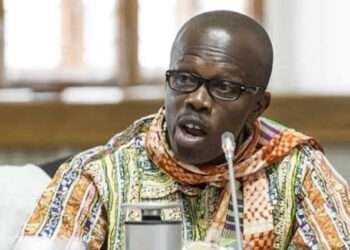The film industries of Ghana and Nigeria have garnered significant attention across Africa and beyond, with both countries producing a wealth of talent and captivating stories.
However, the tendency to compare actors from these two nations has become increasingly prevalent in discussions about African cinema.
While such comparisons seem harmless or informative at first glance, they often overlook the unique cultural contexts, industry dynamics, and individual talents that define each country’s film landscape.
Ghanaian playwright, Kuta Body Alone has called for an end to comparisons between Ghanaian actors and their Nigerian counterparts, stressing that they only undermine the efforts of our local actors.
He believes the Ghanaian film industry boasts of remarkable talent, and that continuous likening to Nigeria’s only dampens our actors’ spirit and hinders our sector’s growth.
Kuta Body praised the dedication and skills of Ghanaian actors. He acknowledged the industry’s challenges while maintaining those local talents far outweighs any negatives.
“Ghanaian actors and film crew are undeniably top-notch. The talent and dedication are there to see. While there may be a few individuals whose conduct or performance falls short of expectations, the majority excel in their craft, consistently producing high-quality work that appeals to both local and international audiences.
“The talent pool in Ghana is rich and dynamic, and the exceptional work of these actors and crew certainly outweighs any shortcomings. It is, therefore, important to resist the temptation to compare Ghanaian actors and film professionals to those in Nollywood.”
Kuta Body Alone
He noted that Nigerians might have gained global recognition, but Ghana’s film industry has its own unique identity and strengths.
The Ghanaian playwright stated that Ghanaian actors, directors, and production teams are making significant strides and creating content that is culturally relevant, entertaining, and thought-provoking.
“So, their contributions should be celebrated and supported as they continue to elevate the standard of filmmaking in Ghana. Highlighting their strengths and professionalism is crucial for the industry’s future success. In fact, more attention should be given to supporting and uplifting the local film space instead.”
Kuta Body Alone
Ghana and Nigeria possess rich and diverse cultural heritages that inform their storytelling. Ghanaian cinema often reflects the country’s history, traditions, and social issues, while Nigerian cinema, particularly Nollywood, is known for its vibrant narratives that range from romance to social dramas and thrillers.
Each industry serves its audience with stories that resonate with their specific cultural contexts, making direct comparisons irrelevant.
The Impact of Comparisons

Comparing actors from Ghana and Nigeria overshadows the unique talents and contributions of individual performers. Each actor brings their skills, experiences, and artistry to their roles, and reducing their abilities to a simple comparison diminishes their achievements.
Celebrating actors for their talents rather than pitting them against one another fosters a more inclusive appreciation of African cinema.
The tendency to compare actors fosters a sense of rivalry between the two nations, which is counterproductive to the collaborative spirit that should exist within the African film industry.
Rather than focusing on competition, it is more beneficial to promote collaboration and exchange between Ghanaian and Nigerian filmmakers and actors, leading to richer storytelling and shared growth.
Explaining further, Kuta Body Alone said the key to the Ghanaian cinema’s success lies in producing high-quality films that meet international standards. “Competing in global markets is important, and this is possible when we have great visuals, good sound, strong acting, solid directing, and strong storylines,” he stated.
“Also, film festivals are vital platforms for showcasing local talent and connecting filmmakers with industry professionals worldwide. Such opportunities are essential for raising the profile of Ghanaian cinema on the global stage.”
Kuta Body Alone
Instead of comparing actors, promoting cross-cultural collaborations leads to innovative storytelling and a blending of artistic styles.
Fostering unity rather than division among African filmmakers and actors strengthens the continent’s cinema on the global stage. By celebrating the diversity of talent and storytelling across Africa, the film industry gains a more substantial foothold in international markets.
Moving away from movies, Kuta Body, who is credited with plays such as ‘Sand in My Sugar’ and ‘Double S’, also shed light on the difficulties faced by the theatre space in Ghana, particularly when it comes to stage productions.
He pointed out the lack of adequate venues and the high costs associated with essential equipment, which makes it increasingly difficult to produce high-quality shows. “In Ghana, staging plays isn’t child’s play. There are not enough theatre spaces, and getting access to lighting, sound, and set design is expensive,” he added.
The comparison of Ghanaian and Nigerian actors is ultimately unnecessary and unproductive. Both countries boast rich cultural narratives, distinct acting styles, and individual talents that deserve recognition and celebration on their terms.
Instead of fostering competition, it is essential to promote collaboration and unity within the African film industry. By focusing on shared challenges and opportunities, Ghana and Nigeria work together to elevate their cinematic landscapes and showcase the richness of African storytelling to the world.
In doing so, they create a vibrant and inclusive film culture that transcends borders and celebrates the diversity of talent across the continent.
READ ALSO: Asogli Power Shutdown 560MW Plant over ECG’s $259 Million Debt





















